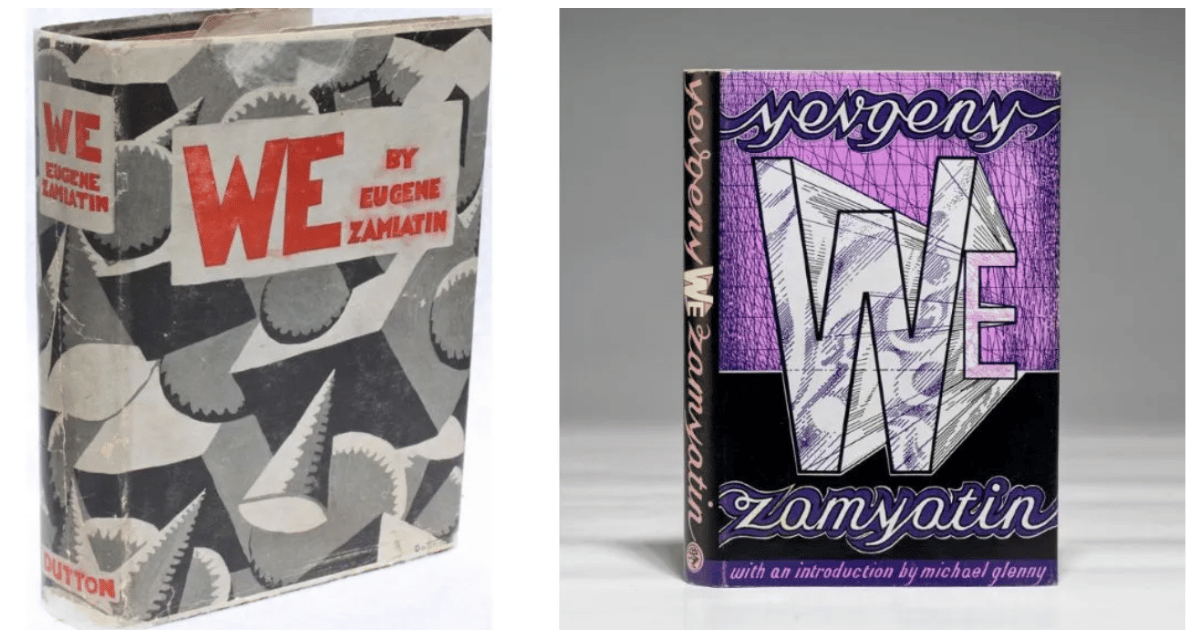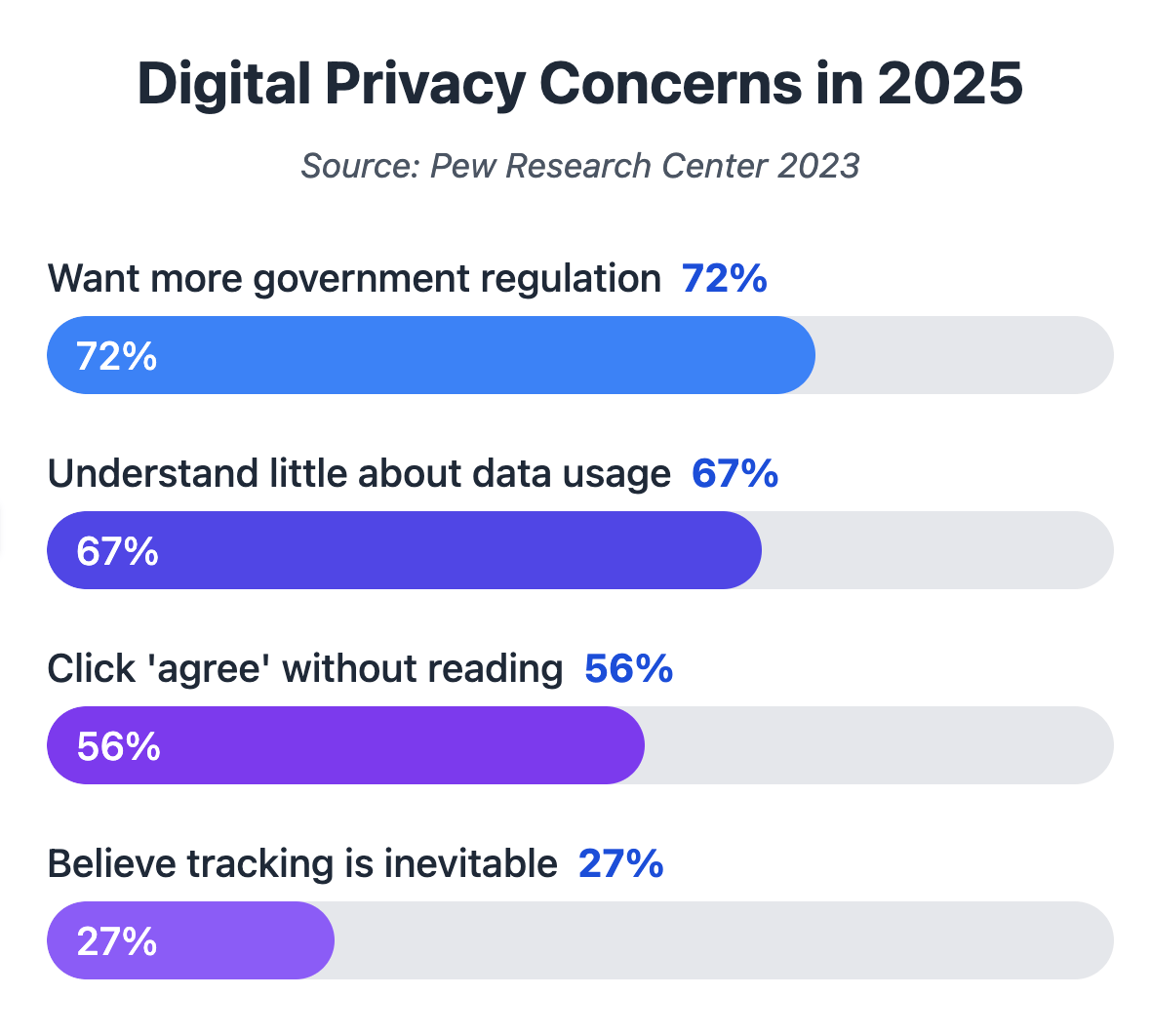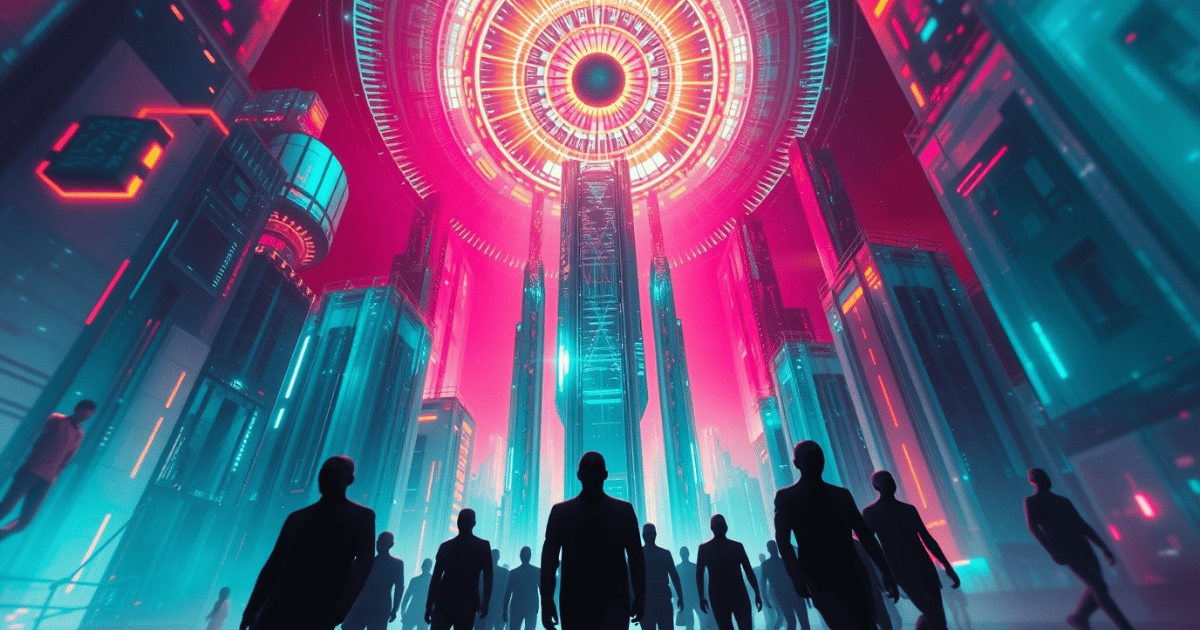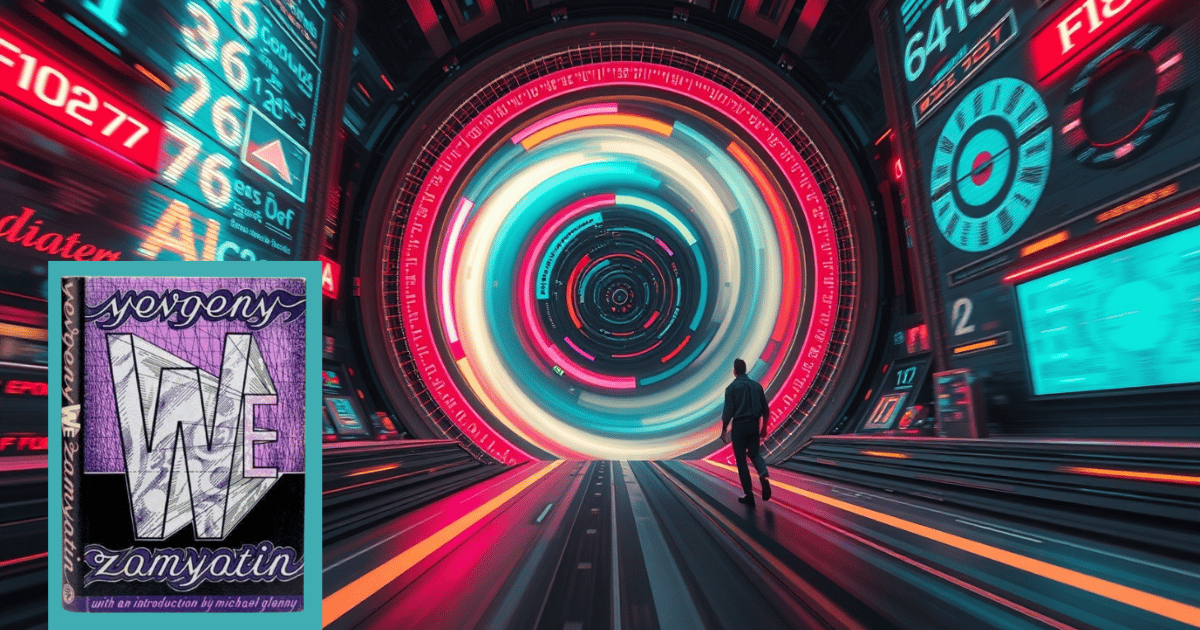Trade freedom for happiness? Have you ever considered the trade-offs, or has this level of personal reflection been drowned out by the torrent of media and alerts?
Here’s 5 reasons you might well already be in a digital One State.
In 1921, Russian engineer Yevgeny Zamyatin took this premise to an extreme. His novel was considered so dangerous it was banned in his homeland for nearly 70 years.
"We" tells of a dystopia of glass apartments, rigid sex scheduling, and individuality sacrificed at the alter of a mathematical paradise. It’s called One State.
100 years later, it appears that we couldn’t be more eager to build that world—one app at a time.
Let's face it: every time you click "I Agree" on those terms of service, you're making the same dark bargain Zamyatin warned of. And it’s a most consequential bargain: happiness without freedom, or freedom without guaranteed happiness?

Left: First edition, New York: E. P. Dutton, 1924, & Right: London: Jonathan Cape, 1970
Reason 1: Life Online is a Glass Cage
"Here and there in the huge mass of glass penetrated by sunshine there were grayish-blue squares, opaque squares of lowered curtains..."
Zamyatin's citizens live in transparent apartments where every move is visible. The reasoning was simple: people who have nothing to hide have nothing to fear. Sound familiar?
Our digital houses are more invasive than anything Zamyatin imagined. We leave online footprints and trails of data that is aggregated to create detailed behavioral profiles.
67% of Americans say they understand very little about what companies do with their data. 27% of Americans feel it's futile to protect their data because "companies will track them anyway." (Source: Deloitte 2023 Mobile Trends)
Unlike Zamyatin's reluctantly conflicted protagonist, we LOVE our glass boxes. We eagerly post our loves, hates, politics and meals all for the world to see.
We’ve traded privacy for validation, and convenience.Rebellion becomes impossible because we've exposed ourselves so completely. And we're PAYING for the privilege.
56% click "agree" on privacy policies without reading them. (Source: Pew Research Center – Americans' views on data privacy (2023))

Reason 2: Slave to the Algorithmic Table
"True freedom is the mathematical absence of choice."
In “We",” the Table of Hours dictates every moment—when to wake, work, walk, and even have sex. During designated "Personal Hours," citizens lower their curtains and redeem state-issued pink coupons for sexual partners.
Between professional demands, personal notifications, intermittent reward mechanisms on apps, and micro-managed attention, we live in a strange simulation of the extreme dystopia in “We.” Swipe Right for a Pink Coupon anyone?
The terrifying brilliance of a digital Table of Hours? It feels like personal choice while narrowing our options to only pre-approved paths.
Online Life, circa 2025:
Data brokers compile dossiers on individuals and create numerous secret scores (consumer loyalty, health risk, fraud risk) that affect opportunities. (Source: EPIC – Data brokers and scoring ("scored society"))
In 2025 forecasts suggest up to 40 billion IoT devices will be online globally. (Source: Deloitte 2023 Mobile Trends)
Reason 3: A Great Mental Operation
"You are perfect. You are machinelike. The road to one hundred per cent happiness is free... hurry to submit to the Great Operation!"
Zamyatin's ultimate horror was the Great Operation—mandatory brain surgery to remove imagination. Citizens lined up willingly, believing it would yield perfect happiness. We’re not yet lobotomizing citizens. Neurolink anyone?
But there’s plenty of chemical operations going on daily in our minds based the media diet we consume and our emotional reaction to that content. In large part our seemingly infinite media buffet satiates us against original thinking which might be dangerous to stability and so-called happiness via scrolling.
"Yes, it is too bad. Apparently a soul has formed in you... Incurable."
The digital version of the Great Operation doesn't require scalpels—just algorithms that slowly atrophy our capacity for imagination and critical thought. We also line up willingly, phones in hand.

Reason 4: Acceptance of Big Tech Benefactor
"If they will not understand that we are bringing them a mathematically faultless happiness, our duty will be to force them to be happy." — The Benefactor
In "We," the all-powerful Benefactor ruled with absolute authority, justified by his ability to deliver "mathematically faultless happiness." Citizens voted unanimously to re-elect him year after year in a mockery of democracy.
Does is bother us that we have adopted Big Tech platforms as our Benefactors?
Meta (Facebook) was fined €390 million for forcing users to accept personalized ads in its terms of service, as the EU ruled explicit opt-in consent was needed. (Source: Forbes/Axios/EU)
Apple's App Tracking Transparency led to 80% of iPhone users opting out of tracking - previously it was a case of out of sight out of mind
62% of smart home users worry about data security and privacy on their devices, with 52% fearing someone could take control of their smart devices. (Source: Deloitte 2023 Mobile Trends)
Digital Benefactors control information flows and creating algorithmic filter bubbles. No one voted for the specific types of Big Tech platforms we use, yet they govern crucial aspects of modern life, while promising the same "mathematically faultless happiness" through optimization algorithms.
"The most effective way to destroy people is to deny and obliterate their own understanding of their history."

Reason 5: Not scaling the Digital Green Wall
"The day has come for us to destroy that Wall and all other walls, so that the green wind may blow all over the earth, from end to end."
The One State was surrounded by the great Green Wall—a literal barrier separating the orderly glass city from the wild, unpredictable natural world. It symbolizes the ultimate separation from authenticity and freedom.
Our baselines of acceptable addiction to devices has shifted radically over the past 20 years. Many of us day to day forget what life was like before we were staring at screens for most of our waking life.
Ours is a self-imposed wall that we cannot see and do not even really recognise is there until we step back and reflect. Do I still exercise my fundamental human skill of imagination, or do I mostly consume media feeds?
Walls keep us comfortable but confined. They protect us from discomfort while cutting us off from the "green wind" of authentic human experience.

Choose Your Paradise
It’s an uncomfortable truth: We're building Zamyatin's dystopia brick by digital brick, not because we're forced to, but because we want to. We like it.
"We have found the way to regain happiness... by removing freedom."
Every day, we can choose small revolutions:
Reclaiming attention from algorithmic feeds
Seeking unmediated experiences beyond the digital Green Wall
Questioning the bargains our digital Benefactors offer
A century ago, Zamyatin saw through the glass walls. The question is: will we?
Share this with someone who needs to break out of their glass cage. Enjoy reading but remember scrolling is fake happiness without freedom.
"There is no final revolution. Revolutions are infinite."
Ink & Time is a weekly newsletter for those who like to read old books - the stuff written before the internet - and also understand the authors and the societal conditions they wrote within still have much to teach us.

